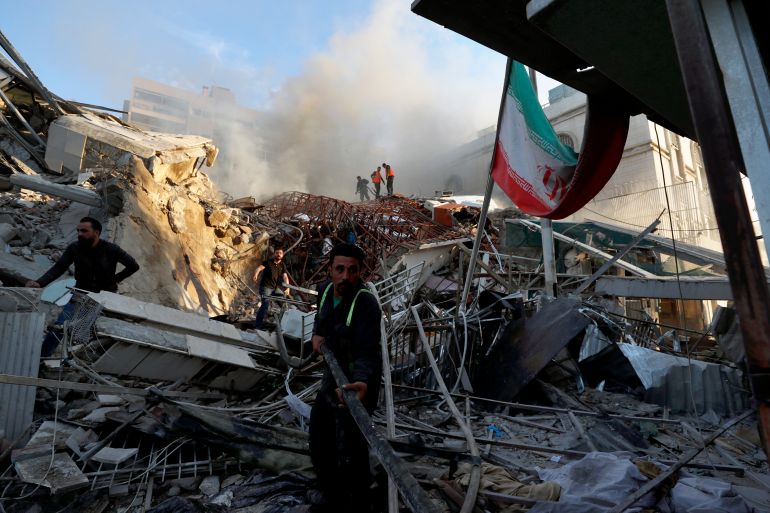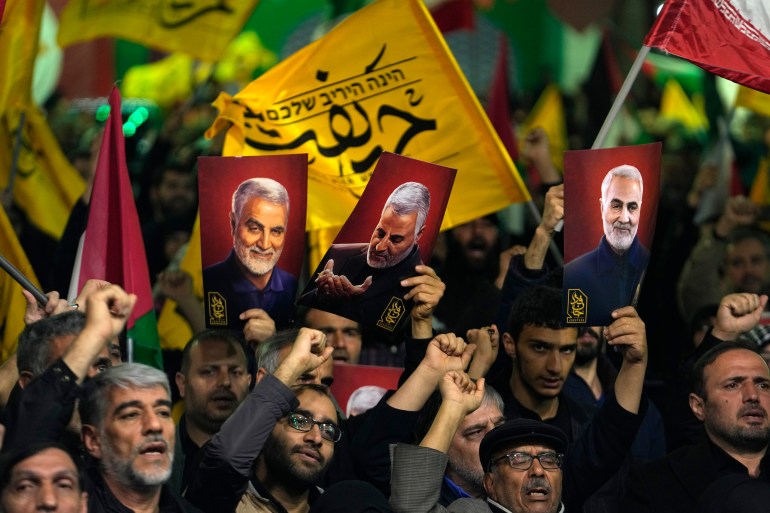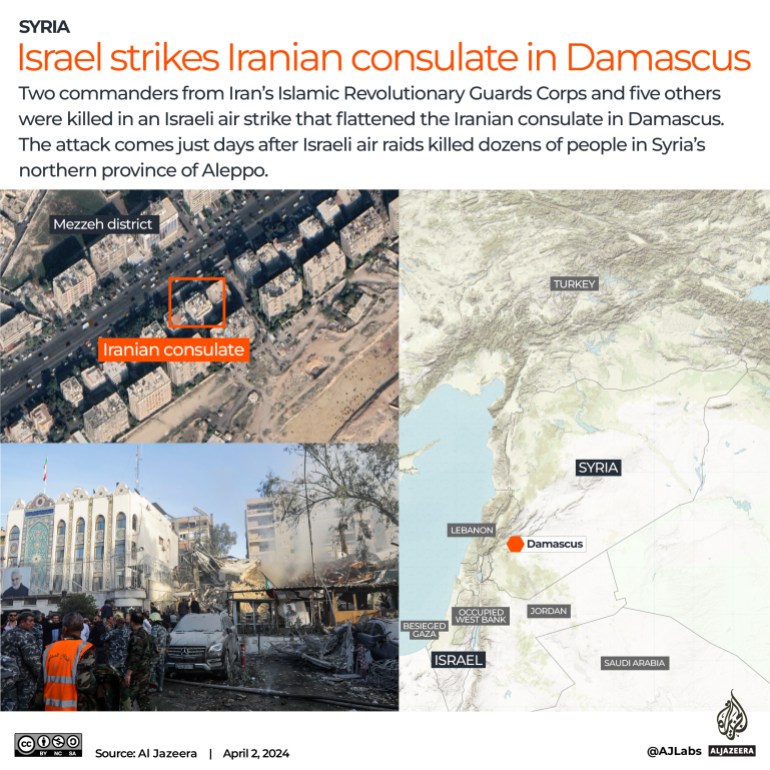Israel strikes Iran consulate in Syria’s capital Damascus: What we know
Iran has promised a response after an alleged Israeli attack on its consulate killed seven including two top commanders.

Iran has promised a response after its consulate in the Syrian capital Damascus was destroyed in a suspected Israeli missile attack, killing seven people including a top commander and his deputy.
Brigadier General Mohammad Reza Zahedi, a senior commander in the Quds Force of the Islamic Revolutionary Guards Corps (IRGC) and his deputy General Mohammad Hadi Hajriahimi were killed in Monday’s attack, the IRGC said in a statement.
Keep reading
list of 4 itemsWHO worker and Iranian adviser among several killed in Syria air strikes
China, Iran and Russia hold joint war games in Gulf of Oman
Iran condemns UN experts’ report on protest crackdown as ‘false’, ‘biased’
Israel has long targeted Iran’s military installations in Syria and those of its proxies but Monday’s attack was the first time it had targeted the embassy compound itself.
Here’s what we know:
What happened?
The consulate, which is next to the main embassy building in Damascus’s Mezzeh district, was struck at about 5pm (14:00 GMT) on Monday.
Photos from the scene showed piles of rubble and twisted steel with an Iranian flag still hanging from a pole nearby.
Who was there?
Several IRGC military advisers were in the building at the time of the attack and seven were killed, according to the IRGC statement.
The statement said Zahedi and Hajriahimi were among the dead.
Zahedi was the leader of the Quds Force in Lebanon and Syria until 2016, it said.
The United Kingdom-based war monitor, the Syrian Observatory for Human Rights, said as many as 11 people had been killed, including eight Iranians, two Syrians and one Lebanese, all of them fighters.
How has Iran reacted?
Iran’s Ambassador to Syria, Hossein Akbari, who was not injured in the attack, said Tehran’s response would be “decisive”.
Iran’s Foreign Minister Hossein Amirabdollahian described the attack “as a violation of all international obligations and conventions” and blamed Israel.
In a separate statement, Iran’s Foreign Ministry spokesman Nasser Kanani said that Iran “reserves the right to carry out a reaction and will decide on the type of response and the punishment of the aggressor”.
Iran’s mission to the United Nations said the strike was a “flagrant violation of the United Nations Charter, international law, and the foundational principle of the inviolability of diplomatic and consular premises”.
Saying the strike was “a significant threat to regional peace and security”, the Iranian mission urged the UN Security Council to condemn the attack and said Tehran reserved the right “to take a decisive response”.
Protesters took to the streets of Tehran to condemn Israel over the attack.
How have others reacted?
Syria said “innocents” had been killed in the strike.
“We strongly condemn this atrocious terrorist attack that targeted the Iranian consulate building in Damascus and killed a number of innocents,” said Syrian Foreign Minister Faisal Mekdad who visited the scene of the attack along with Syria’s interior minister.
Russia, an ally of Syrian President Bashar al-Assad, also joined the condemnation.
“We strongly condemn this unacceptable attack against the Iranian consular mission in Syria,” Russia’s Foreign Ministry said in a statement.

Lebanon’s Iran-backed Hezbollah group warned that Israel would pay for the attack.
Hezbollah has exchanged near-daily cross-border fire with Israel in support of its ally Hamas since the Gaza war erupted in October.
“Certainly, this crime will not pass without the enemy receiving punishment and revenge,” Hezbollah said in a statement on Tuesday. It added that Zahedi was “one of the first to support, sacrifice, and persevere for many years to develop and advance the work of the resistance [Hezbollah] in Lebanon”.
Muslim countries including Iraq, Jordan, Oman, Pakistan, Qatar, Saudi Arabia and the United Arab Emirates also condemned the attack.
In the United States, meanwhile, State Department spokesperson Matthew Miller told reporters that Washington remained “concerned about anything that would be escalatory or cause an increase in conflict in the region”.
When asked about the attack, an Israeli military spokesperson told journalists: “We do not comment on reports in the foreign media.”
The New York Times cited four unnamed Israeli officials as acknowledging that Israel was responsible for the attack.

What could the consequences be?
The attack appeared to signify an escalation of Israel’s targeting of military officials from Iran, which provides money and weapons to hardline groups fighting Israel in Gaza and along its border with Lebanon.
But analysts appear divided over whether the action would bring about a regional war.
Jon Alterman of the Center for Strategic and International Studies in Washington, DC, said Israel probably saw the strike more as a deterrent.
“The Israelis are convinced that if they seek to hang back, the threat will grow and not diminish,” he said. “They are persuaded that as long as they do something like this periodically, their adversaries will be deterred.”
However, Steven Cook, an analyst at the Council on Foreign Relations in Washington, said there was a danger of escalation.
“The IRGC can loosen restraints on proxies in Iraq and Syria, placing American forces in jeopardy again,” he said. “The Iranians could also direct Hezbollah to escalate its attacks on Israel, which have been growing bolder and more numerous.”
The chief spokesman for Israel’s army, Daniel Hagari, said a drone attack on a naval base in southern Israel later on Monday was “directed by Iran” and caused no injuries.
Early on Tuesday, the Israeli military said some kind of weapon fired from Syria towards Israel crashed before reaching its intended target.
Ali Vaez, the director of the International Crisis Group’s Iran Project, agreed there was a risk of expanded conflict but that it might not be of too much concern to Israel.
“[This] puts Israel in a win-win situation because Israel knows Iran doesn’t want to get dragged into a regional war, so if it escalates its attacks against Iranian assets and personnel in Syria, it probably will be cost-free and if Iran does respond and retaliate, then it becomes a justified pretext for expanding the war.”